HISTORY IN THE NEWS:

DEDICATED TO THE ORIGINS OF CONTEMPORARY EVENTS AROUND THE WORLD.

HISTORY IN THE NEWS, moribund, almost dead, makes its very last cry for Nelson Mandela, in honour of his life and in honour of his memory.
TIMELINE FOR THE HISTORY OF NELSON MANDELA.
With thanks to:
- http://news.bbc.co.uk/2/hi/7500615.stm
-http://www.nelsonmandela.org/content/page/timeline
-http://www.nelsonmandelas.com/nelson-mandela-timeline.php
-http://www.cnn.com/2012/12/11/world/africa/nelson-mandela---fast-facts
Youth
18 July 1918-Rolihlahla Mandela is born in a small South African village called Mvezo.
1925- Mandela becomes the first person in his family to go to school. A teacher gives him the name Nelson after having difficulty pronouncing his real name.
1927- (circa) Entrusted to Thembu Regent Jongintaba Dalindyebo

Education.
1934- Undergoes initiation; Attends Clarkebury Boarding Institute in Engcobo
1937 - Having passed his Junior Certificate in two years at Clarkebury Boarding Institute Mandela joins Healdtown, a college in Fort Beaufort.1939- Enrolls at the University College of Fort Hare, in Alice but is expelled in 1940.

Walter Sisulu.
1941 Mandela flees to Johannesburg, to avoid an arranged marriage. There he meets Walter Sisulu and begins work at his law firm.
1941-1943- Sisulu becomes a mentor and lifelong friend. Sisulu introduces Mandela to the law firm Witkin, Sidelsky and Eidelman, where he obtains a position. Mandela earns his B.A. degree, enrolls in law school and joins the ANC.
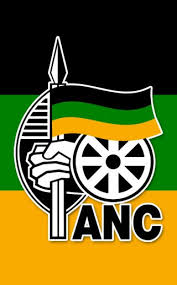
1942- Completes BA through the University of South Africa (UNISA)
The African National Congress.
1942- Begins to attend African National Congress (ANC) meetings informally.
1943- Graduates with BA from Fort Hare; Enrols for an LLB at Wits University.
1944 Two years after joining the African National Congress (ANC), Mandela and 60 other young members form the ANC Youth League. He marries Evelyn Ntoko Mase – they have four children: Thembekile (1945); Makaziwe (1947 – who die. s after nine months); Makgatho (1950); Makaziwe (1954)
1948 Mandela Elected national secretary of the ANCYL. The ANC The National Party comes to power on the policy of apartheid. The ANC launch a campaign of passive resistance against the laws. They later begin the Campaign for the Defence of Unjust Laws.
1951- Elected President of the ANCYL.

The Defiance Campaign.
1952- Defiance Campaign begins; Arrested and charged for violating the Suppression of Communism Act; Elected Transvaal ANC President; Convicted with J.S Moroka, Walter Sisulu and 17 others under the Suppression of Communism Act; Sentenced to nine months imprisonment with hard labour, suspended for two years; Elected first of ANC deputy presidents.
1952- Dec.- Mandela and Oliver Tambo open a law office in downtown Johannesburg and take on a heavy load of cases involving blacks persecuted under the new apartheid laws. Mandela and Tambo provide legal services to those who would have normally had no representation.
1953 The ANC is concerned that it will be banned so Mandela is tasked with ensuring the party can work underground.
1955- Mandela watches as the Congress of the People at Kliptown launches the Freedom Charter.
Mandela Charged with Treason.
1956 Along with 155 others, Mandela is arrested and charged with treason. After a four-year trial, the charges are dropped.
1958- Divorces Evelyn Mase; Marries Nomzamo Winnie Madikizela – they have two daughters: Zenani (1959) and Zindzi (1960)
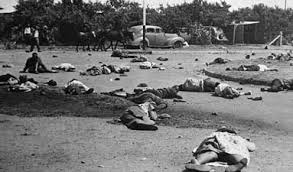
The Sharpeville Massacre. The Repressive Regime of Frensch Verwoerd.
1958- Sept- Hendrik Frensch Verwoerd becomes prime minister and strictly enforces apartheid policies. As former minister of native affairs, Verwoerd had been responsible for much of the apartheid legislation.
21 March 1960- Police kill 69 people, including women and children, as black people protest in Sharpeville against restrictions on their freedom of movement. A state of emergency is declared, amid fears of retaliation, and the ANC is banned.
1959-April- former ANC Youth League member, Robert Sobukwe, launches the Pan Africanist Congress (PAC), a new political group that opposes including whites and Indians in the anti-apartheid struggle.
1960- March 30- A State of Emergency imposed and Mandela is among thousands detained.
ANC Driven Underground; Madela Arrested.
1960- April 8- The ANC is banned
1961- The ANC concludes that peaceful protest is not enough to combat apartheid and forms an underground military wing, Umkhonto we Sizwe (Spear of the Nation). Mandela, now vice-president of the ANC, is appointed as the group's first leader.
1962- Having spent a year underground, on August 5, Mandela is arrested near Howick in KwaZulu-Natal for incitement and leaving the country without a passport. He is sentenced to five years in jail on Robben Island.
1963- While Mandela is in prison, fellow ANC members are arrested. They are
charged with sabotage and treason, along with Mandela. The men appear in
court in Rivonia.

Mandela Sentenced to Life on Robben Island.
1964- June 12- At the end of the eight-month trial, Mandela and seven other defendants (with the exception of Rusty Bernstein and James Kantor) are given life sentences and taken to prison on Robben Island.
1968-1969- within a one-year period, Mandela's mother dies and his oldest son is killed in a car crash. Mandela is not allowed to attend the funerals.
1976- Soweto students protest mandatory instruction in Afrikaans, the language of the white rulers. Protests spread throughout Soweto. In crushing it, the government kills 575 people over an eight month period, a fourth of them under age 18.
1977- Winnie is banished to Brandfort, a remote township. Her daughter Zindzi goes with her. Over the following years, Winnie will spend over a year in jail (including solitary confinement) and face constant police harassment and humiliation. In response, she becomes more aggressive and militant in opposing white rule.
1978-Vorster resigns; P.W. Botha, who held various political appointments in the National Party, takes over as prime minister.
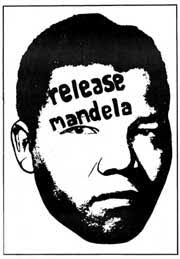
The 'Release Mandela Campaign.'
1980- In exile, Oliver Tambo and the ANC launch the "Release Mandela" campaign. In the following years, numerous countries and international groups sign petitions, pass resolutions and hold rallies for Mandela's release.
1982- March 31- Mr Mandela, Sisulu, Raymond Mhlaba and Andrew Mlangeni and later Ahmed Kathrada are sent to Pollsmoor Prison.
1983-1984- Angered by rent increases and Botha's plan for giving Indian and mixed-race voters--but not blacks--token places in Parliament, black residents of townships south of Johannesburg start an insurrection that spreads across the country. The police respond brutally. In one township, Langa, 20 people are fatally shot at a funeral procession.

Mandela Refuses a Deal with PW Botha.
1985- Rejects South African President PW Botha's offer to release him if he renounces violence.
1986- April- Winnie's increasingly controversial and militant activities culminate in a speech at a funeral in which she endorses "necklace murders'--the death by burning tires around the necks of those who collaborate with the government. Her speech is widely reported in the foreign press as a call to violence; it is privately denounced by the ANC.
1988- Aug 12- Admitted to Tygerberg Hospital and is diagnosed with Tuberculosis. In December he is moved to Victor Verster Prison in Paarl where he was held for 14 months in a cottage.

FW deKlerk Becomes President, accepts Power Sharing.
1989- Aug- Botha resigns and FW de Klerk is sworn in as acting president. Mandela is encouraged when de Klerk releases most of the Rivonia Trial prisoners, including Sisulu, and begins to dismantle the apartheid structure. He abandons the long-term master plan of congregating blacks into separate homelands, and accepts the principle of "power sharing" with them. De Klerk recognizes that apartheid is not working. Despite millions of arrests for violations of the pass laws, blacks continue to migrate into banned areas.
1990- Feb 2- ANC is unbanned

Mandela Freed from Prison; Elected President of the ANC.
11 February 1990- Mandela is freed after 27 years, as a result of a relaxation of apartheid laws and the lifting of the ban on the ANC. He is greeted by large crowds as he and wife Winnie leave the prison grounds.
1990- March 2- Elected ANC Deputy President
1991- At the ANC's first national conference in South Africa, Mandela is elected president of the party.
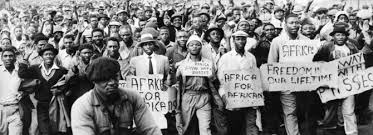
Difficult Negotiations with deKlerk. ANC launches Mass Action.
1991- Dec 20- The first formal negotiations with the government take place at the Convention for a Democratic South Africa (CODESA 1). Mandela lashes out at de Klerk in a speech, after de Klerk berated the ANC in an earlier speech. They don't meet again for five months.
1992- June-Sept- frustrated over the unsuccessful negotiations, the ANC decides on a policy of "rolling mass action" consisting of strikes, protests and boycotts, to show the government the support the ANC has across the country. Meanwhile, the violence continues with an Inkatha raid on ANC members that leaves 46 dead in Boipatong township.

Mandela and deKlerk: The Record of Understanding.
1992- Sept- increasing death toll forces Mandela and de Klerk to restart negotiations. They sign the Record of Understanding, which promises to establish formal investigations into the violence and police actions. It also establishes an elected constitutional assembly that will develop a new constitution for the country.
Mandela and deKlerk win Nobel peace Prize.
1993-Mandela, along with South African President FW De Klerk, is awarded the Nobel Peace Prize for efforts to bring stability to South Africa. Accepting the award, Mandela says: "We will do what we can to contribute to the renewal of our world."

Mandela elected President of South Africa.
27 April 1994-South Africans, including Nelson Mandela (voting for the first time in his life) vote in the country's first democratic election. Mandela, leader of the ANC, is elected as the country's first black president.
10 May 1994 Nelson Mandela addresses the crowds at his inauguration, saying: "Let freedom reign, God bless Africa!" Thabo Mbeki, Mandela's deputy, takes over the day-to-day running of government, leaving Mandela to promote the country around the world.
1994- Dec- Launches his autobiography Long Walk to Freedom
February 1995- To mark the fifth anniversary of his release, Nelson Mandela visits Robben Island, the prison he was held in for 18 years.
1995- Establishes the Nelson Mandela Children's Fund.
1996- Divorces Winnie Mandela
1998- July 15- Marries Graça Machel on his 80th birthday.
1999- Steps down after one term as President, establishes the Nelson Mandela Foundation.

Mandela in Retirement.
1999- Thabo Mbeki takes over from Mandela as president of South Africa and goes on to win the 1999 presidential election.
2000- Mandela is appointed mediator civil war in Burundi.
2001-Mandela is diagnosed with prostate cancer and begins a course of radiation.
2003- Establishes the Mandela Rhodes Foundation
2003- Supports 46664 AIDS fund raising campaign. (named after his prison number)
2004- Announcing his retirement from public life, Mandela says he plans to enjoy a quieter life and spend more time with his family.
2005- Jan 6- Announces that his eldest son Makgatho had died of AIDS
Joking with reporters, he says: "The appeal therefore is - don't call me, I'll call you."
2007- Witnesses the installation of his grandson Mandla as chief of the Mvezo Traditional Council

Mandela Founds the Elders.
2007- Despite his retirement, Mandela forms The Elders. The group, which includes Archbishop Desmond Tutu and other statesmen and women, aims to help tackle the world's problems.
2008- Musicians, film stars and politicians join Mandela at a concert in London's Hyde Park to celebrate his 90th birthday. Speaking to the crowd he says "It is time for new hands to lift the burdens, it is in your hands now."
2008- July 18- Turns 90 years old, asks future generations to continue the fight for social justice
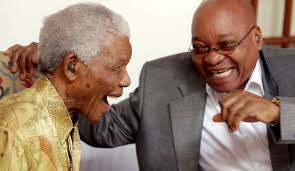
Inauguration of Jacob Zuma.
2009- Votes for the fourth time in his life; Attends the inauguration of President Jacob Zuma on May 9 and witnesses Zuma's first State of the Nation address; Turns 91
2009- The United Nations General Assembly declares July 18 'Mandela Day' as a tribute to his contribution to world freedom.
2010- Is formally presented with the Fifa World Cup trophy before it embarks on a tour of South Africa.
2010- June 11- His great-granddaughter Zenani is killed in a car accident
2010- July 11- Makes a surprise appearance at the Final of the Fifa World Cup in Soweto.
2010- Oct- His second book Conversations with Myself is published.
2010- Nov. 18 - Meets the South African and American football teams that played in the Mandela Challenge match
2011- Jan- Is admitted to hospital in Johannesburg where he was diagnosed with a chest infection. He is discharged after two nights.

'Nelson Mandela By Himself'
2011- June- His book Nelson Mandela By Himself: The Authorised Book of Quotations is published
2011- Jun 21- Is visited at home by American First Lady Michelle Obama and her daughters Sasha and Malia. Dec 18-Is admitted to hospital
2012- Feb 5- Admitted to hospital for abdominal complaint. Discharged after one night.
2012 - March- The Nelson Mandela Digital Archive Project is launched. Google gives a $1.25 million grant to help preserve and digitize thousands of archival documents including items donated by Mandela himself.

Mandela's Failing Health.
2013- March 9-April 6- In hospital off and on.
2013 April 29- - The South Africa Broadcasting Corporation (SABC) releases video of Mandela as he sits at home surrounded by South Africa President Zuma and other government officials. SABC and the African National Congress, which has been critical of media in the past, are accused of political exploitation.
2013-in hosptal since June 8

DEDICATED TO THE ORIGINS OF CONTEMPORARY EVENTS AROUND THE WORLD.
HISTORY IN THE NEWS, moribund, almost dead, makes its very last cry for Nelson Mandela, in honour of his life and in honour of his memory.
TIMELINE FOR THE HISTORY OF NELSON MANDELA.
With thanks to:
- http://news.bbc.co.uk/2/hi/7500615.stm
-http://www.nelsonmandela.org/content/page/timeline
-http://www.nelsonmandelas.com/nelson-mandela-timeline.php
-http://www.cnn.com/2012/12/11/world/africa/nelson-mandela---fast-facts
Youth
18 July 1918-Rolihlahla Mandela is born in a small South African village called Mvezo.
1925- Mandela becomes the first person in his family to go to school. A teacher gives him the name Nelson after having difficulty pronouncing his real name.
1927- (circa) Entrusted to Thembu Regent Jongintaba Dalindyebo
Education.
1934- Undergoes initiation; Attends Clarkebury Boarding Institute in Engcobo
1937 - Having passed his Junior Certificate in two years at Clarkebury Boarding Institute Mandela joins Healdtown, a college in Fort Beaufort.1939- Enrolls at the University College of Fort Hare, in Alice but is expelled in 1940.
Walter Sisulu.
1941 Mandela flees to Johannesburg, to avoid an arranged marriage. There he meets Walter Sisulu and begins work at his law firm.
1941-1943- Sisulu becomes a mentor and lifelong friend. Sisulu introduces Mandela to the law firm Witkin, Sidelsky and Eidelman, where he obtains a position. Mandela earns his B.A. degree, enrolls in law school and joins the ANC.
The African National Congress.
1942- Begins to attend African National Congress (ANC) meetings informally.
1943- Graduates with BA from Fort Hare; Enrols for an LLB at Wits University.
1944 Two years after joining the African National Congress (ANC), Mandela and 60 other young members form the ANC Youth League. He marries Evelyn Ntoko Mase – they have four children: Thembekile (1945); Makaziwe (1947 – who die. s after nine months); Makgatho (1950); Makaziwe (1954)
1948 Mandela Elected national secretary of the ANCYL. The ANC The National Party comes to power on the policy of apartheid. The ANC launch a campaign of passive resistance against the laws. They later begin the Campaign for the Defence of Unjust Laws.
1951- Elected President of the ANCYL.
The Defiance Campaign.
1952- Defiance Campaign begins; Arrested and charged for violating the Suppression of Communism Act; Elected Transvaal ANC President; Convicted with J.S Moroka, Walter Sisulu and 17 others under the Suppression of Communism Act; Sentenced to nine months imprisonment with hard labour, suspended for two years; Elected first of ANC deputy presidents.
1952- Dec.- Mandela and Oliver Tambo open a law office in downtown Johannesburg and take on a heavy load of cases involving blacks persecuted under the new apartheid laws. Mandela and Tambo provide legal services to those who would have normally had no representation.
1953 The ANC is concerned that it will be banned so Mandela is tasked with ensuring the party can work underground.
1955- Mandela watches as the Congress of the People at Kliptown launches the Freedom Charter.
Mandela Charged with Treason.
1956 Along with 155 others, Mandela is arrested and charged with treason. After a four-year trial, the charges are dropped.
1958- Divorces Evelyn Mase; Marries Nomzamo Winnie Madikizela – they have two daughters: Zenani (1959) and Zindzi (1960)
The Sharpeville Massacre. The Repressive Regime of Frensch Verwoerd.
1958- Sept- Hendrik Frensch Verwoerd becomes prime minister and strictly enforces apartheid policies. As former minister of native affairs, Verwoerd had been responsible for much of the apartheid legislation.
21 March 1960- Police kill 69 people, including women and children, as black people protest in Sharpeville against restrictions on their freedom of movement. A state of emergency is declared, amid fears of retaliation, and the ANC is banned.
1959-April- former ANC Youth League member, Robert Sobukwe, launches the Pan Africanist Congress (PAC), a new political group that opposes including whites and Indians in the anti-apartheid struggle.
1960- March 30- A State of Emergency imposed and Mandela is among thousands detained.
ANC Driven Underground; Madela Arrested.
1960- April 8- The ANC is banned
1961- The ANC concludes that peaceful protest is not enough to combat apartheid and forms an underground military wing, Umkhonto we Sizwe (Spear of the Nation). Mandela, now vice-president of the ANC, is appointed as the group's first leader.
1962- Having spent a year underground, on August 5, Mandela is arrested near Howick in KwaZulu-Natal for incitement and leaving the country without a passport. He is sentenced to five years in jail on Robben Island.
Mandela Sentenced to Life on Robben Island.
1964- June 12- At the end of the eight-month trial, Mandela and seven other defendants (with the exception of Rusty Bernstein and James Kantor) are given life sentences and taken to prison on Robben Island.
1968-1969- within a one-year period, Mandela's mother dies and his oldest son is killed in a car crash. Mandela is not allowed to attend the funerals.
1976- Soweto students protest mandatory instruction in Afrikaans, the language of the white rulers. Protests spread throughout Soweto. In crushing it, the government kills 575 people over an eight month period, a fourth of them under age 18.
1977- Winnie is banished to Brandfort, a remote township. Her daughter Zindzi goes with her. Over the following years, Winnie will spend over a year in jail (including solitary confinement) and face constant police harassment and humiliation. In response, she becomes more aggressive and militant in opposing white rule.
1978-Vorster resigns; P.W. Botha, who held various political appointments in the National Party, takes over as prime minister.
The 'Release Mandela Campaign.'
1980- In exile, Oliver Tambo and the ANC launch the "Release Mandela" campaign. In the following years, numerous countries and international groups sign petitions, pass resolutions and hold rallies for Mandela's release.
1982- March 31- Mr Mandela, Sisulu, Raymond Mhlaba and Andrew Mlangeni and later Ahmed Kathrada are sent to Pollsmoor Prison.
1983-1984- Angered by rent increases and Botha's plan for giving Indian and mixed-race voters--but not blacks--token places in Parliament, black residents of townships south of Johannesburg start an insurrection that spreads across the country. The police respond brutally. In one township, Langa, 20 people are fatally shot at a funeral procession.
Mandela Refuses a Deal with PW Botha.
1985- Rejects South African President PW Botha's offer to release him if he renounces violence.
1986- April- Winnie's increasingly controversial and militant activities culminate in a speech at a funeral in which she endorses "necklace murders'--the death by burning tires around the necks of those who collaborate with the government. Her speech is widely reported in the foreign press as a call to violence; it is privately denounced by the ANC.
1988- Aug 12- Admitted to Tygerberg Hospital and is diagnosed with Tuberculosis. In December he is moved to Victor Verster Prison in Paarl where he was held for 14 months in a cottage.
FW deKlerk Becomes President, accepts Power Sharing.
1989- Aug- Botha resigns and FW de Klerk is sworn in as acting president. Mandela is encouraged when de Klerk releases most of the Rivonia Trial prisoners, including Sisulu, and begins to dismantle the apartheid structure. He abandons the long-term master plan of congregating blacks into separate homelands, and accepts the principle of "power sharing" with them. De Klerk recognizes that apartheid is not working. Despite millions of arrests for violations of the pass laws, blacks continue to migrate into banned areas.
1990- Feb 2- ANC is unbanned
Mandela Freed from Prison; Elected President of the ANC.
11 February 1990- Mandela is freed after 27 years, as a result of a relaxation of apartheid laws and the lifting of the ban on the ANC. He is greeted by large crowds as he and wife Winnie leave the prison grounds.
1990- March 2- Elected ANC Deputy President
1991- At the ANC's first national conference in South Africa, Mandela is elected president of the party.
Difficult Negotiations with deKlerk. ANC launches Mass Action.
1991- Dec 20- The first formal negotiations with the government take place at the Convention for a Democratic South Africa (CODESA 1). Mandela lashes out at de Klerk in a speech, after de Klerk berated the ANC in an earlier speech. They don't meet again for five months.
1992- June-Sept- frustrated over the unsuccessful negotiations, the ANC decides on a policy of "rolling mass action" consisting of strikes, protests and boycotts, to show the government the support the ANC has across the country. Meanwhile, the violence continues with an Inkatha raid on ANC members that leaves 46 dead in Boipatong township.
Mandela and deKlerk: The Record of Understanding.
1992- Sept- increasing death toll forces Mandela and de Klerk to restart negotiations. They sign the Record of Understanding, which promises to establish formal investigations into the violence and police actions. It also establishes an elected constitutional assembly that will develop a new constitution for the country.
Mandela and deKlerk win Nobel peace Prize.
1993-Mandela, along with South African President FW De Klerk, is awarded the Nobel Peace Prize for efforts to bring stability to South Africa. Accepting the award, Mandela says: "We will do what we can to contribute to the renewal of our world."
Mandela elected President of South Africa.
27 April 1994-South Africans, including Nelson Mandela (voting for the first time in his life) vote in the country's first democratic election. Mandela, leader of the ANC, is elected as the country's first black president.
10 May 1994 Nelson Mandela addresses the crowds at his inauguration, saying: "Let freedom reign, God bless Africa!" Thabo Mbeki, Mandela's deputy, takes over the day-to-day running of government, leaving Mandela to promote the country around the world.
1994- Dec- Launches his autobiography Long Walk to Freedom
February 1995- To mark the fifth anniversary of his release, Nelson Mandela visits Robben Island, the prison he was held in for 18 years.
1995- Establishes the Nelson Mandela Children's Fund.
1996- Divorces Winnie Mandela
1998- July 15- Marries Graça Machel on his 80th birthday.
1999- Steps down after one term as President, establishes the Nelson Mandela Foundation.
Mandela in Retirement.
1999- Thabo Mbeki takes over from Mandela as president of South Africa and goes on to win the 1999 presidential election.
2000- Mandela is appointed mediator civil war in Burundi.
2001-Mandela is diagnosed with prostate cancer and begins a course of radiation.
2003- Establishes the Mandela Rhodes Foundation
2003- Supports 46664 AIDS fund raising campaign. (named after his prison number)
2004- Announcing his retirement from public life, Mandela says he plans to enjoy a quieter life and spend more time with his family.
2005- Jan 6- Announces that his eldest son Makgatho had died of AIDS
Joking with reporters, he says: "The appeal therefore is - don't call me, I'll call you."
2007- Witnesses the installation of his grandson Mandla as chief of the Mvezo Traditional Council
Mandela Founds the Elders.
2007- Despite his retirement, Mandela forms The Elders. The group, which includes Archbishop Desmond Tutu and other statesmen and women, aims to help tackle the world's problems.
2008- Musicians, film stars and politicians join Mandela at a concert in London's Hyde Park to celebrate his 90th birthday. Speaking to the crowd he says "It is time for new hands to lift the burdens, it is in your hands now."
2008- July 18- Turns 90 years old, asks future generations to continue the fight for social justice
Inauguration of Jacob Zuma.
2009- Votes for the fourth time in his life; Attends the inauguration of President Jacob Zuma on May 9 and witnesses Zuma's first State of the Nation address; Turns 91
2009- The United Nations General Assembly declares July 18 'Mandela Day' as a tribute to his contribution to world freedom.
2010- Is formally presented with the Fifa World Cup trophy before it embarks on a tour of South Africa.
2010- June 11- His great-granddaughter Zenani is killed in a car accident
2010- July 11- Makes a surprise appearance at the Final of the Fifa World Cup in Soweto.
2010- Oct- His second book Conversations with Myself is published.
2010- Nov. 18 - Meets the South African and American football teams that played in the Mandela Challenge match
2011- Jan- Is admitted to hospital in Johannesburg where he was diagnosed with a chest infection. He is discharged after two nights.
'Nelson Mandela By Himself'
2011- June- His book Nelson Mandela By Himself: The Authorised Book of Quotations is published
2011- Jun 21- Is visited at home by American First Lady Michelle Obama and her daughters Sasha and Malia. Dec 18-Is admitted to hospital
2012- Feb 5- Admitted to hospital for abdominal complaint. Discharged after one night.
2012 - March- The Nelson Mandela Digital Archive Project is launched. Google gives a $1.25 million grant to help preserve and digitize thousands of archival documents including items donated by Mandela himself.
Mandela's Failing Health.
2013- March 9-April 6- In hospital off and on.
2013 April 29- - The South Africa Broadcasting Corporation (SABC) releases video of Mandela as he sits at home surrounded by South Africa President Zuma and other government officials. SABC and the African National Congress, which has been critical of media in the past, are accused of political exploitation.
2013-in hosptal since June 8

No comments :
Post a Comment